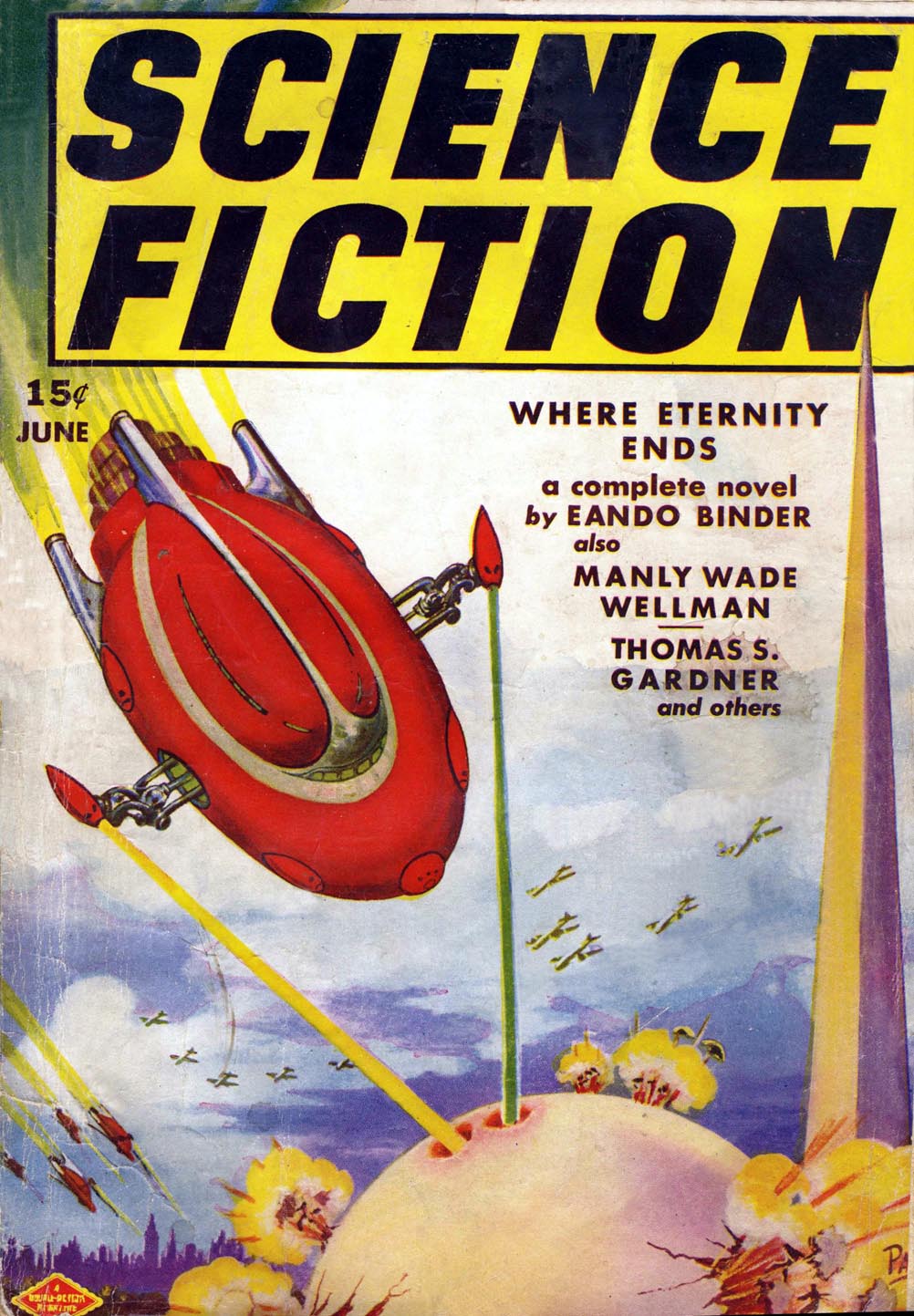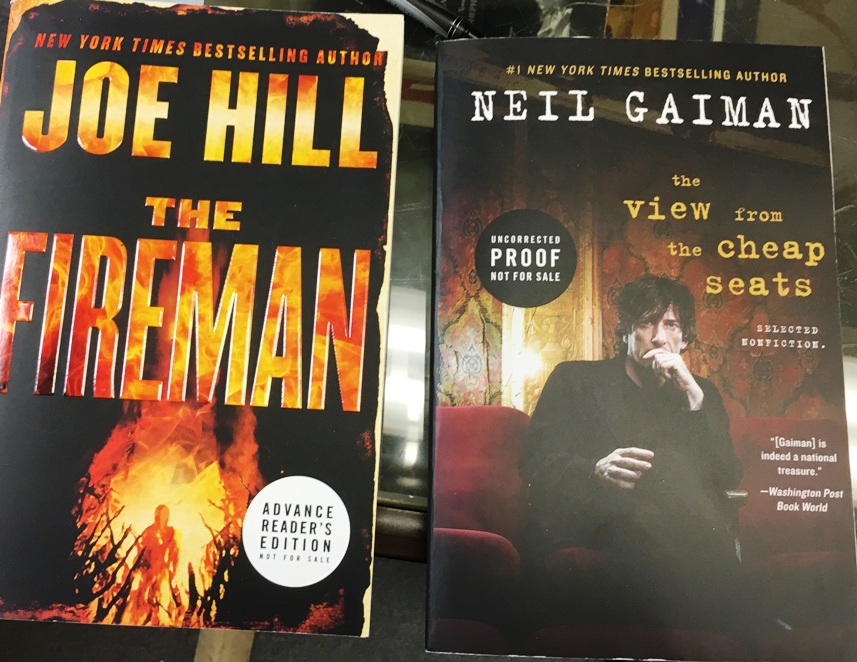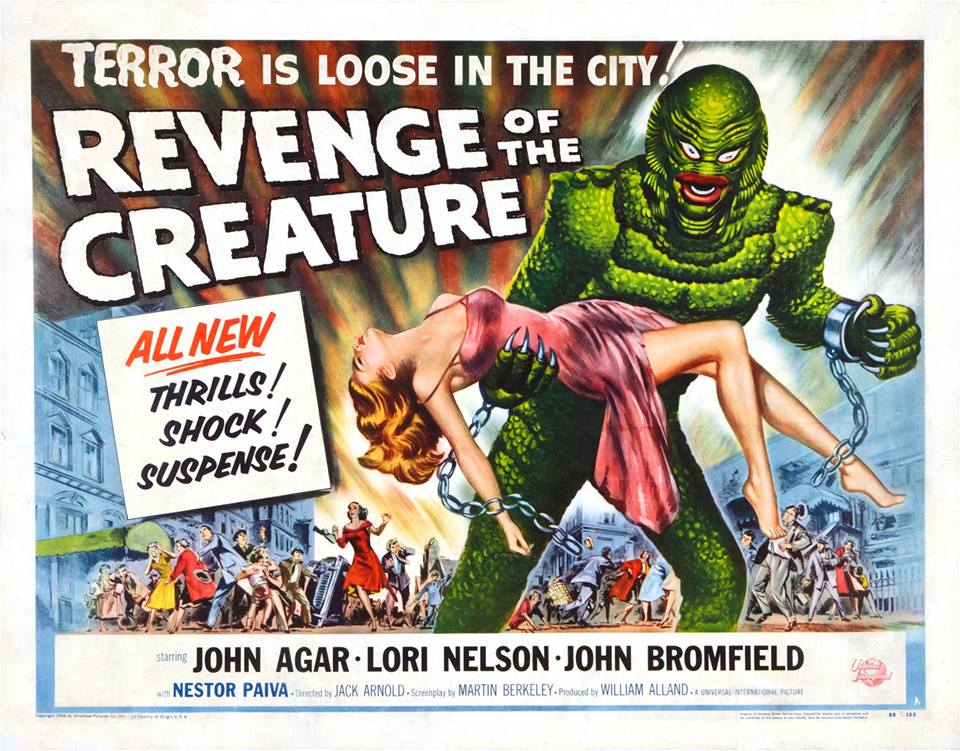(1) MAN INTO SPACE. Wake up The Traveler – the thing sf fans have dreamed about just happened! “[April 12, 1961] Stargrazing (The Flight of Vostok)” at Galactic Journey.
The jangling of the telephone broke my slumber far too early. Groggily, I paced to the handset, half concerned, half furious. I picked it up, but before I could say a word, I heard a frantic voice.
“Turn on your radio right now!”
I blinked. “Wha..” I managed.
“Really!” the voice urged. I still didn’t even know who was calling.
Nevertheless, I went to the little maroon Zenith on my dresser and turned the knob. The ‘phone was forgotten in my grip as I waited for the tubes to warm up. 10 seconds later, I heard the news.
It happened. A man had been shot into orbit. And it wasn’t one of ours.
(2) MAKING IT BETA. R. S. Belcher thanks “The League of Extraordinary Beta Readers” at Magical Words.
Stephen King says in On Writing, to write with the door closed and edit with the door open. I agree wholeheartedly with that sentiment. Your beta readers get first dibs when you open that door, they are your test audience. I have worked with different beta readers on different projects and over time, you find the folks that are going to help you the most with getting the very best out of your writing. A few tips I’d offer that have worked for me.
1) Punctuality: If it takes your beta reader as long to read and get your MS back to you as it took you to write it, they may not be the person you need. By the same token, if you get it back the same day you sent it off to them to read, chances are they skimmed it, so take their advice with a grain of salt.
2) Consistency: If three of your beta-readers all pick up on the same thing, LOOK AT IT and consider their advice. I’ve found that that trait is a flag for readers who I can count on to be giving me good, consistent feedback on trouble spots in the book.
3) Objectivity: If all a friend, family member, or loved one can give you as feedback is how awesome every word is, that is great for the poor writer’s ego but not much help to the professional writer. By the same token, if all you get is negative feedback, you may need to take that advice with a grain of salt too. Some beta readers are glass-half-full people and others are more glass-half-empty.
(3) STARTING LINES. Rachel Swirsky studies the first lines of her own stories, then others’.
“First lines Part I: Half a Dozen of My Recent Stories”.
I decided it might be interesting to look at some of the first lines of my stories. I’m grabbing a half-dozen first lines from some of my recent publications. I’m only looking at stories that are online, so if people want to see how the first line relates to the rest of the story, they can.
Tomorrow, I’ll look at a half-dozen from some of my favorite stories.If this proves interesting (to me or readers), I may do more another time.
“Love Is Never Still” in Uncanny Magazine
“Through every moment of carving, I want her as one wants a woman.”
I’m happy with this–which is useful because I essentially just finished it (six months ago). The story begins as a retelling of the myth of Galatea, a statue who is wished to life when her sculptor falls in love. For people who are versed in Greek mythology, this should evoke Galatea as a possibility — carving, want, woman.
“First Lines Part II: from Some of My Favorite Stories”
“The Evolution of Trickster Stories among the Dogs of North Park after the Change” by Kij Johson
“North Park is a backwater tucked into a loop of the Kaw River: pale dirt and baked grass, aging playground equipment, silver-leafed cottonwoods, underbrush, mosquitoes and gnats blackening the air at dusk.”
Obviously, this sentence is scene setting. Kij makes it beautiful with her specific details: “pale dirt,” “baked grass,” “aging playground equipment,” “silver-leafed cotton-woods,” “mosquitoes,” “gnats.” Almost all of the details evoke slow decay–“backwater,” “baked grass,” “aging.” Insects don’t gather in the air so much as dirty it–“blackening” the dusk. The evoked colors are washed out–pale, baked, silver–we can possibly also include the old metal and rust of the playground equipment. The silver-leafed cottonwoods are the exception here–the color is on the grey/black spectrum, yes, but the tree still sounds beautiful. This is decay, but not hopeless decay.
The sentence also establishes the academic tone. This is the kind of sentence assembled by someone speaking authoritatively about a subject, not describing their sensory impressions of the world. The phrasing is formal and complex, and the use of the colon an even more significant marker.
(4) BEYOND LIMITS. John Carlton’s “Generation Ships”, an interesting critique of Kim Stanley Robinson’s Aurora, focuses on the requirements for such a space mission. How many other stimulating observations might Carlton have made if he had read the book?
Kim Stanley Robinson wrote a book recently apparently to show that interstellar travel is impossible….
It’s not possible to travel between the stars and even if we could, the missions would all fail. Of course he also believes that utopia is possible as some sort of Socialist paradise. Now that’s a fantasy….
As an engineer, I think that Mr. Robinson is clearly wrong. Or at least, he doesn’t understand the basic rules for setting mission parameters and designing to meet those parameters. Mr. Robison’s vessel failed because he wanted it to fail. But to extend that to saying that ALL such proposals would fail is more than a little egotistical. And wrong, really wrong.
Now I haven’t as yet read the book. Reading Greg Benford’s review left me going WTF, WTF, WTF, are you kidding? If you are going to write a book on pioneering could you at least set it up so that the pioneers are at least a little realistic. A ship without a captain or seemingly a crew? No community structure? What was it, a commune in space? Of course something like that is going to fail. That’s what happens to fragile structure and the commune is the most fragile of all. Just look at all the failed examples in the 19th Century. So that’s fail #1….
(5) GALAKTIKA MAGAZINE. SFWA President Cat Rambo has been following A.G. Carpenter’s reports about the Hungarian magazine that published numerous stories in translation without paying the original authors. Rambo wrote a post at her blog about receiving “Answers to Some Galaktika Magazine Questions”.
In the process of talking to people, I dropped Istvan Burger [editor in chief of Galaktika] a mail because I had these questions:
- Would all writers be paid, preferably without their having to contact Galaktika?
- Would all translators be paid? (my understanding was that the same lack of payment has happened with them.)
- For any online stories, would authors be able to request that the story be taken down?
- Would a process be put in place to ensure this never happens again?
Here’s the reply:
Dear Cat, I’m writing on behalf of Istvan Burger, editor in chief of Galaktika.
We’d like to ask authors to contact us directly to agree on compensation methods. You can give my email address to the members. [email protected]
The short stories were published in a monthly magazine, which was sold for two months, so these prints are not available any more. So Authors don’t need to withdraw their works. As we wrote in our statement, there is no problem with novels, as all the rights of novels were paid by us in time.
Also let me emphasise again that all the translators were paid all the time!
You can quote my reply. Thank you for your help!
Best regards, Katalin Mund, Manager of Galaktika Magazine
(6) CARPENTER OPINES ON LATEST GALAKTIKA RESPONSE. Anna Grace Carpenter, who has been developing this story, commented on Burger’s answers to Rambo in “Galaktika Magazine: Legacy”.
Mr. Burger and Mr. Nemeth have offered vague explanations that are, quite frankly, not satisfactory given the number of years this theft has occurred. But whether it was ignorance or laziness or just the inclination that if they could get away with it, they would, something has to change drastically going forward.
I would really like to think that the offer to provide compensation for the authors whose work has been stolen indicates the problem has been resolved. Although requiring the individual authors be aware they’ve been stolen from and making them responsible for seeking payment does not seem a good faith step.
And there is the question that Cat Rambo raised regarding whether authors could or would be able to request their work withdrawn from Galaktika. She referenced a potential online edition (which is seems there is not one), but the response from Katalin Mund was as follows.
The short stories were published in a monthly magazine, which was sold for two months, so these prints are not available any more. So Authors don’t need to withdraw their works.
As I mentioned earlier, a comment from a Hungarian reader promptly revealed the misrepresentation of that statement.
They state it, but this is a flat-out lie. Nearly ALL back issues are available for ordering on the publisher’s webshop, http://galaktikabolt.hu/. I checked, and every issue from the year 2015 is available now. (The original article on mandiner.hu was about the magazine’s 2015 issues.) They’re not digital copies, the physical, paper-based issues are still sold.
At the very best, Mund and Galaktika are misrepresenting the situation regarding further sales of the pirated work. And this is key – they are selling that work.
(7) HEINLEIN SOCIETY SCHOLARSHIPS. The Heinlein Society is taking applications for three $1,000 scholarships for undergraduate students at accredited 4-year colleges and universities.
The “Virginia Heinlein Memorial Scholarship” is dedicated to a female candidate majoring in engineering, math, or physical sciences (e.g. physics, chemistry). The other two scholarships may be awarded to either a male or female, and add “Science Fiction as literature” as an eligible field of study.
Applicants will need to submit a 500-1,000 word essay on one of several available topics.
Those interested should fill out the Scholarship Application 2016 [PDF file] and print or email. The deadline to apply is May 15. Winners will be announced on July 7.
(8) KEN LIU. At B&N Sci-Fi Fantasy Blog, Ken Liu describes “5 Chinese Mythological Creatures That Need to Appear in More SF/F”. You know it’s a winner, because five!
Pixiu
Usually depicted as a sort of winged lion—but with the wings folded to the sides of the body—the pixiu is said to be one of the nine children of the loong. Like the loong, it has antlers on its head (the male pixiu has two antlers and the female just one).
As one of the most auspicious Chinese mythological creatures, statues of the pixiu once stood at ancient city and palace gates as guardians. These days, the pixiu is more often seen in the form of small jade pendants dangling from rear-view mirrors or worn as jewelry for good luck. In this evolution lies a rather interesting tale.
In the oldest Chinese sources, the pixiu is depicted as a ferocious beast. The legendary Yellow Emperor recruited the fiercest animals into a special unit of his army in the war against the Yan Emperor, and the pixiu made the cut along with bears and tigers and similar apex predators (another interpretation of this passage is that the beasts were the totems of the tribes who followed the Yellow Emperor). In classical texts, the pixiu is thus often used as a metaphor for a powerful army.
But folklore also speaks of the pixiu violating the decorum of the heavenly court by pooping on the floor. To punish the creature, the Jade Emperor sealed the pixiu’s anus so that it could only eat but never defecate. The pixiu is supposed to go around devouring evil spirits and demons and convert their essence into gold and treasure, which it must hold in its belly forever. This explains the pixiu’s reputation as a bringer of wealth.
I like to think of the pixiu as a precursor for the modern military-industrial complex.
(9) MAGAZINE TO SUSPEND PUBLISHING. Interfictions Online is going on hiatus after the November 2016 issue. The editors have posted this letter:
Dear Friends of Interfictions,
With your support, we have run a marvelous magazine for three years.
At this point, Interfictions needs to take a break to allow the Interstitial Arts Foundation to figure out how to best support us. Our archives will remain available and free, but as of December 2016, the magazine will be on indefinite hiatus.
We will be ending this round of the magazine with a fantastic fall issue in November 2016. We’re going to solicit material for it, so there won’t be an open submissions period. We promise it will thrill and inspire you!
Thank you for participating in this project as artists, writers, readers, and listeners.
Sincerely, The Editors
(10) AFTER YOU SELL THE SERIES. Women in Animation’s Professional Development program will present a panel on Tuesday, April 26 – “They Said Yes! Now What?”
A follow-up to last year’s highly successful panel, “Who Says Yes? And Why?”. This panel will cover what someone who has created or developed an animated series does once they get a positive response, the legal and business issues of the actual deal, and what you can expect after the studio or network says yes, including the development process from this point forward (What? You thought you were done developing it when you sold it?) and just how much you can expect to be involved with or in charge of the series.
Free for WiA members. $15 for non-members. Panelists include Jennifer Dodge (SVP, Development, Nickelodeon Preschool), Cort Lane (SVP, Animation & Family Entertainment, Marvel Televsion), Annette van Duren (agent), Donna Ebbs (producer, former exec at The Hub and Disney), and Craig Miller (writer-producer)
(11) STORY OF YOUR LIFE. A Paramount movie based on Ted Chiang’s short story “Story of Your Life” is expected to open in the fall of 2016. Amy Adams will play the linguist Dr. Louise Banks, Jeremy Renner will play the theoretical physicist Ian Donnelly, and Forest Whitaker plays a military figure (Colonel Weber). An extended segment of the film was screened at CinemaCon, a trade show for theater owners.
io9 has the news:
A linguist and a theoretical physicist are the stars of the latest movie from the director of Sicario and the upcoming Blade Runner 2. The movie is Story Of Your Life, based on the short story by Ted Chiang, and this Amy Adams/Jeremy Renner movie looks awesome.
Paramount Pictures screened an extended look at the film as part of CinemaCon, a trade show in which movie studios show their upcoming films to theater owners. Paramount showcased Ninja Turtles 2, Ben Hur, Jack Reacher 2 and plenty of other upcoming releases (not including Star Trek Beyond, for some reason.) But the highlight was Story Of Your Life, which has no release date yet but is expected to open this fall.
(12) VOLCANIC ENDINGS. Leah Schnelbach, writing at length about “Preparing Myself for Death with Joe Versus the Volcano” at Tor.com, implicitly argues that this Tom Hanks movie is worth the fine-toothed-comb study she gives it.
At the dawn of the ’90s, a film was released that was so quirky, so weird, and so darkly philosophical that people who turned up expecting a typical romantic comedy were left confused and dismayed. That film was Joe Versus the Volcano, and it is a near-masterpiece of cinema.
There are a number of ways one could approach Joe Versus the Volcano. You could look at it in terms of writer and director John Patrick Shanley’s career, or Tom Hanks’. You could analyze the film’s recurring duck and lightning imagery. You could look at it as a self-help text, or apply Campbell’s Hero Arc to it. I’m going to try to look at it a little differently. JVtV is actually an examination of morality, death, and more particularly the preparation for death that most people in the West do their best to avoid. The film celebrates and then subverts movie clichés to create a pointed commentary on what people value, and what they choose to ignore. Plus it’s also really funny!
The plot of JVtV is simple: sad sack learns he has a terminal illness. Sad sack is wasting away, broke and depressed on Staten Island, when an eccentric billionaire offers him a chance to jump into a volcano. Caught between a lonely demise in an Outer Borough and a noble (if lava-y) death, sad sack chooses the volcano. (Wouldn’t you?) Along the way he encounters three women: his coworker DeDe, and the billionaire’s two daughters, Angelica and Patricia. All three are played by Meg Ryan. The closer he gets to the volcano the more wackiness ensues, and the film culminates on the island of Waponi-Wu, where the Big Wu bubbles with lava and destiny. Will he jump? Will he chicken out? Will love conquer all? The trailer outlines the entire plot of the film, so that the only surprise awaiting theatergoers was…well, the film’s soul, which is nowhere to be seen here…
(13) HOW MANY STICKY QUARTERS IS THAT? A Frank R. Paul cover from the collection of Dr. Stuart David Schiff is currently up for auction. The owner of “Where Eternity Ends”, a pulp magazine cover from the June 1939 issue of Science Fiction, is looking for an opening bid of $6,000.
Here’s how the piece looked when published. The original art can be seen at the auction link.

(14) YOU HEARD IT HERE FIRST. The Hugo results are in!
I would like to announce that I've won all the Hugo Awards in every category this year. There will be no ceremony. Everyone can relax.
— Renay? (@renay) April 12, 2016
(15) VIRGIN AMERICA HUMOR. Jeb Kinnison writes, “Friend Steve Freitag works as a gate agent at Virgin and often comes up with fun comments on the status sign. Since they’re being bought by Alaska and probably won’t be free to have such fun soon, he put up a selection of the best…”
Here’s a sample – click to see the full gallery.
(16) THE ART OF THE DICE. David Malki (Wondermark) posted a new batch of Roll-a-Sketch artwork.
I just got back from the Emerald City Comicon in Seattle, and here are a few favorites of the many Roll-a-Sketch drawings I made for folks there!
Roll-a-Sketch, as longtime readers know, is something I do at conventions and other appearances: folks can roll some dice to select random words from a list, and then I have the task of combining those words into a creature! …
LEGO + HIPSTER + CTHULHU + EGG:

[Thanks to Jeb Kinnison, John King Tarpinian, Rob Thornton, and Will R. for some of these stories. Title credit goes to File 770 contributing editor of the day Kip W.]



